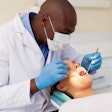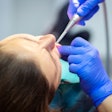
Some 90% of Michigan dental practices provide an average of $62,000 annually in free or discounted care to low-income children and adults, according to the results of a survey released this week by the Michigan Dental Association (MDA).
But the MDA says the situation is an "unsustainable effort to prop up an underfunded Medicaid safety net."
The survey of 990 members of the association found that more than half (55%) of the care they provide to this patient population is for restorative procedures such as crowns and fillings, 16% for oral surgery, and 7% for preventive care. Of the $62,000 in donated care, $45,000 was provided by dentists and $17,000 was by dental staff.
Some 88% of the dentists and dental labs in the MDA responded to the study, which was conducted by Web interviews between September 10 and October 4, 2012, by the Marketing Resource Group on behalf of the MDA.
Cost of care
The majority of the dentists who responded (92.5%) work in private practices, and nearly three-quarters (74%) own their practices, according to the association.
“It becomes unsustainable when government programs ... are not adequately funded.”
Association president
"Michigan dentists are trying to address the access problem as effectively as possible, but it becomes unsustainable when government programs designed to achieve that goal are not adequately funded," MDA President Jeff Johnston, DDS, told DrBicuspid.com. "We don't need more providers; we need a more adequate system for covering the actual cost of care."
Medicaid covers only 40% of the cost of providing dental care, the survey found. Only 22% of the dentists surveyed say they take Medicaid patients, citing low reimbursement and administrative paperwork. Some 10% of the respondents said they don't participate in the program because they fear being suspected of Medicaid fraud.
In contrast, 81% of dentists participate in Michigan's Healthy Kids Dental program for Medicaid children, which reimburses dentists at rates similar to private insurance, the survey noted. The MDA called the program an "effective model" for addressing the dental health needs of the disadvantaged.
Michigan cut adult dental Medicaid benefits five years ago but reinstated them after state officials noticed they were paying more for emergency room visits, which had skyrocketed, according to Dr. Johnston.
"That's a lesson they've had to relearn," he told DrBicuspid.com. "It's cheaper to have adult Medicaid than ER visits."
The goal of the survey was to show how much dentists are doing to improve oral care in their communities, he noted.
"When I became president, one goal was to let the public know about the good things dentists are doing to increase access to care," he said.
Dr. Johnston applauded Gov. Rick Snyder for supporting statewide expansion of the program, which currently covers children in 75 of Michigan's 83 counties but not some of the largest counties.
"Michigan policymakers and residents must understand the vital connection between oral health and the rising incidence of diabetes, for example," Dr. Johnston said. "And there is little recognition that the most common childhood disease is not asthma but tooth decay, which leads to 51 million lost school days nationwide every year and an inestimable toll on learning."
Insufficient funding, patient apathy
Some 62% of dentists who responded to the survey said insufficient funding of government programs was the main reason Michigan's uninsured and underserved can't get dental care, the survey found. Another 26% said the primary cause was apathy about the importance of oral health.
Some 88% said they provided free or discounted care in their offices to special needs patients, an average of nearly $43,000 per office annually; 27% provided such care in local clinics.
Karlene Ketola, executive director of the Michigan Oral Health Coalition, said she commends dentists' efforts to provide free or discounted care to low-income families. But healthcare can't be based solely on charitable efforts, she added.
"Oral health is essential to overall health, and we applaud dentists' volunteer efforts to provide care to Michigan's low-income families," Ketola said in a statement. "However, an effective healthcare delivery system cannot be based on the goodwill efforts of dental providers alone. Efforts to expand access, improve provider rates, and coordinate the dental safety net for all underserved Michiganders are essential."
The governor's budget calls for spending $11.6 million for the continued expansion of the program to cover an additional 70,500 children in Ottawa, Ingham, and Washtenaw counties, according to a story on mlive.com.
A preliminary Senate budget plan includes expansion of the program, but does not specify which counties should get the service. A budget plan moving through the House does not include expansion of the program.
The governor wants to expand Medicaid under the federal Patient Protection and Affordable Care Act, but Republicans lawmakers have not agreed to that plan.



















